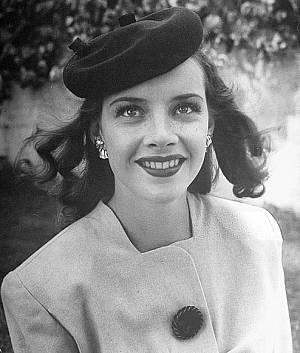Susanne Petersson
Susanne Petersson | |
|---|---|
 Susanne Petersson in 1960 | |
| Born | 3 September 1939 Garés, Free Territories |
| Died | 19 September 2019 (aged 80) |
| Nationality | Gylian |
| Occupation | Actress |
| Years active | 1958–1999 |
Susanne Petersson (Gylic transcription: Suzan Peterson; 3 September 1939 – 19 September 2019) was a Gylian actress. She achieved fame for her work in the orgone film genre, where she specialised in roles of industrious, quirky entrepreneurs, making her a symbol of the National Obligation period and Groovy Gylias.
Early life
Susanne was born on 3 September 1939 in Garés. She was of mixed Nordic and French descent, reflected in her name, and the oldest of two children.
She grew up in the Free Territories, and educated in volunteer classes. Her father died when she was young during the Liberation War, and she was raised by her mother afterwards.
She said of her upbringing: "We were poor, but we managed, and we had fun." In adolescence, she worked in a department store, earning money to help support her mother and brother. She was passionate about sports, being an avid swimmer and tennis player.
Her interest in acting came about by chance, when she took a drama class because she thought it would be easier than a cooking class. By the age of 18, she made the decision to pursue a career in acting.
Career
Rise to stardom
Susanne got a career breakthrough in the 1960 film L'femme d'argent. Originally written as a harsh satire of business activities, her casting in the lead prompted the director and screenwriter to revise the film considerably, softening it into a quirky comedy that better matched her talents. Her performance earned critical acclaim, and helped drive the film to modest success, thus establishing the model for her career.
She followed it up with additional roles in orgone films, including the acclaimed Three Coins in the Fountain (1961) which teamed her up with fellow orgone stars Máiréad Ní Conmara and Victoria Douglas. She evolved with the genre as the National Obligation period gave way to Groovy Gylias, focusing on light comedies and georgette films.
Typical roles
Susanne's typical roles were industrious, quirky entrepreneurs. Her characters' defining trait was a fixation with money, which was played for laughs. Her best-known catchphrase was "I think I could make some money out of this!", which was always delivered directly towards the camera and punctuated with a sly wink.
Her characters were usually merchants or engaged in some variety of self-employment. Radix noted that her characters were presented as "squeaky clean, upstanding, and deeply principled" — always in search of ways to make money by providing services or selling necessary goods. Indeed, several of her comedies portrayed her as the heroine facing off against more unscrupulous, explicitly capitalist hucksters.
Susanne relied heavily on "age ambiguity" on screen. Often, she played "young fogeys" — youthful characters humorously shown idolising adulthood and trying to act older than their age, which only emphasised their cuteness.
She had a playful on-screen presence, and was part of a cohort of Gylian actresses celebrated for their fourth wall-breaking, which included Carla Miló, Sima Daián and Rauna Næsve. This aspect was refined as her films achieved artistic maturity, making her comedies jovially self-referential. Her on-screen persona was refined into "a long-lost Valente daughter": her characters developed a tongue-in-cheek obsession with "efficiency" in all areas of life, and their asides to the audience began to be accompanied by humorous graphics and animation that poked fun at attempts to quantify and "scientise" quotidian parts of life.
Gylian symbol
She became a style icon, based on her "slightly-trying-too-hard" Levystile wardrobe, and was recognised as Gylian cinema's "foremost merchant". Audiences found her preoccupation with money and efficiency "sweetly nostalgic", a throwback to the "hurried province" in the midst of the Golden Revolution.
Reception abroad
During the Gylian Invasion, Susanne's films unexpectedly found significant popularity in the Northern States, where her combination of cute innuendo and affectionate parody of entrepreneurship strongly appealed to Northian sensibilities.
She was very proud of this, particularly due to her part-Northian ancestry, and embraced her Northian audience, even traveling there on occasion to work with Northian directors and actors on films.
Later career
Susanne's popularity declined in the 1970s, as the loss of her youthful appearance robbed her films of the "age ambiguity" and cuteness that had been central to their appeal. However, she continued working, and transformed her on-screen persona. Where her youthful characters had idolised adulthood, her older characters now embodied an ideal of adult life: moderately prosperous, peaceful, with a family and children, and rich in social capital.
She admitted in interviews that she wanted to give audiences "a nice, appealing vision of adulthood" — one that represented comfort and contentedness rather than stress and dissatisfaction. She was particularly keen to emphasise that her characters had achieved their ambitions on their own terms, working for themselves rather than others, and despite their obsession with money, ironically their greatest assets turned out to be sturdy, lifelong friendships and solid marriages.
She retired from acting on her 60th birthday.
Death
She died on 19 September 2019, two weeks after her 80th birthday, of natural causes.
Private life
She was married, without children, and outlived her husband.